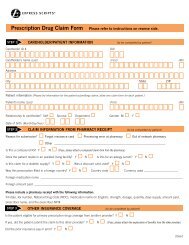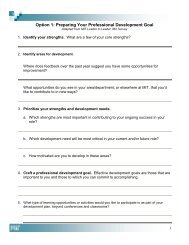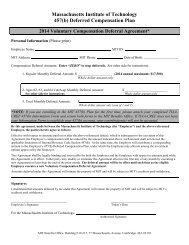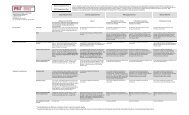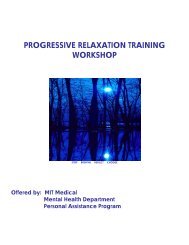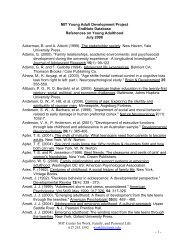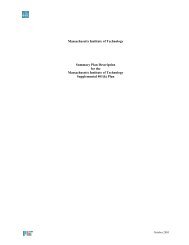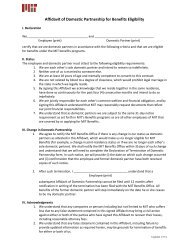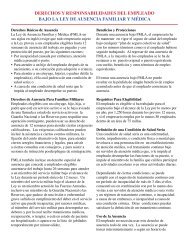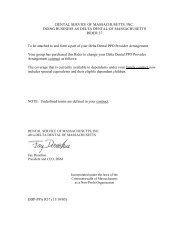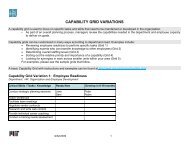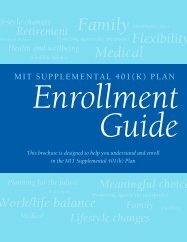Helping parents in developing countries improve adolescents' health
Helping parents in developing countries improve adolescents' health
Helping parents in developing countries improve adolescents' health
You also want an ePaper? Increase the reach of your titles
YUMPU automatically turns print PDFs into web optimized ePapers that Google loves.
A few projects had been <strong>in</strong> existence for a number of years, but their numbers were found<br />
to be <strong>in</strong>creas<strong>in</strong>g, and awareness of <strong>parents</strong>’ critical roles came <strong>in</strong>to sharper focus. These<br />
projects had been operat<strong>in</strong>g largely <strong>in</strong> isolation, unknown to each other, and to global<br />
efforts on behalf of adolescent <strong>health</strong>.<br />
Of the 34 projects that were identified, 13 were <strong>in</strong> the WHO African Region, 5 <strong>in</strong> the Region of<br />
the Americas, 5 <strong>in</strong> the South-East Asian Region, 2 <strong>in</strong> the European Region (Eastern Europe),<br />
1 <strong>in</strong> the Eastern Mediterranean Region, and 8 <strong>in</strong> the Western Pacific Region. A total of 15<br />
projects had been discont<strong>in</strong>ued at the time of the review, with the rema<strong>in</strong>der still ongo<strong>in</strong>g.<br />
Susta<strong>in</strong>ability issues <strong>in</strong>cluded fund<strong>in</strong>g, <strong>in</strong>stitutional capacity and government support.<br />
The portrait that emerges is one of a rich diversity of projects <strong>in</strong> all regions of the develop<strong>in</strong>g<br />
world, from Kenya to Colombia, Bhutan to Lithuania, and Viet Nam to Jamaica. They share a<br />
common recognition of the importance of parent<strong>in</strong>g, and a commitment to support <strong>parents</strong><br />
as one component of a plan for reduc<strong>in</strong>g adolescent <strong>health</strong> risk behaviours.<br />
Meld<strong>in</strong>g research and programm<strong>in</strong>g<br />
WHO convened a meet<strong>in</strong>g † with researchers and representatives from some of the projects<br />
to discuss the literature review and the project summaries. Discussions dur<strong>in</strong>g the meet<strong>in</strong>g<br />
identified two additional parental roles: respect for <strong>in</strong>dividuality and modell<strong>in</strong>g appropriate<br />
behaviour. The meet<strong>in</strong>g also generated additions to the project summaries, as well as<br />
recommendations and an articulation of the challenges commonly faced by such projects.<br />
A summary of the discussions <strong>in</strong> the meet<strong>in</strong>g follows and highlights the importance<br />
of <strong>parents</strong> <strong>in</strong> prevent<strong>in</strong>g adolescent <strong>health</strong> risk behaviours, the ways <strong>in</strong> which <strong>parents</strong><br />
<strong>in</strong>fluence these behaviours, and their implications for programmes aim<strong>in</strong>g to <strong>improve</strong><br />
adolescent <strong>health</strong>.<br />
Parents’ roles can be organized <strong>in</strong>to five dimensions, each of which has specific<br />
<strong>in</strong>fluences on adolescent <strong>health</strong> outcomes:<br />
1. connection – love<br />
2. behaviour control – limit<br />
3. respect for <strong>in</strong>dividuality – respect<br />
4. modell<strong>in</strong>g of appropriate behaviour – model<br />
5. provision and protection – provide.<br />
These parent<strong>in</strong>g roles, build<strong>in</strong>g on those earlier <strong>in</strong> childhood, are played out <strong>in</strong> daily<br />
<strong>in</strong>teractions with adolescents. Parents are usually unconscious of the <strong>in</strong>dividual roles and<br />
of their potential consequences on <strong>health</strong> and development.<br />
Each of the five roles is described below, <strong>in</strong>clud<strong>in</strong>g its contribution to adolescent <strong>health</strong><br />
and the correspond<strong>in</strong>g evidence base. Also outl<strong>in</strong>ed, where available knowledge exists,<br />
† The “Meet<strong>in</strong>g to Review Interventions to Support the Parents of Adolescents” was held <strong>in</strong> Switzerland <strong>in</strong> October 2006.<br />
See list of participants <strong>in</strong> Annex 1.<br />
8 <strong>Help<strong>in</strong>g</strong> <strong>parents</strong> <strong>in</strong> develop<strong>in</strong>g <strong>countries</strong> <strong>improve</strong> adolescents’ <strong>health</strong>



